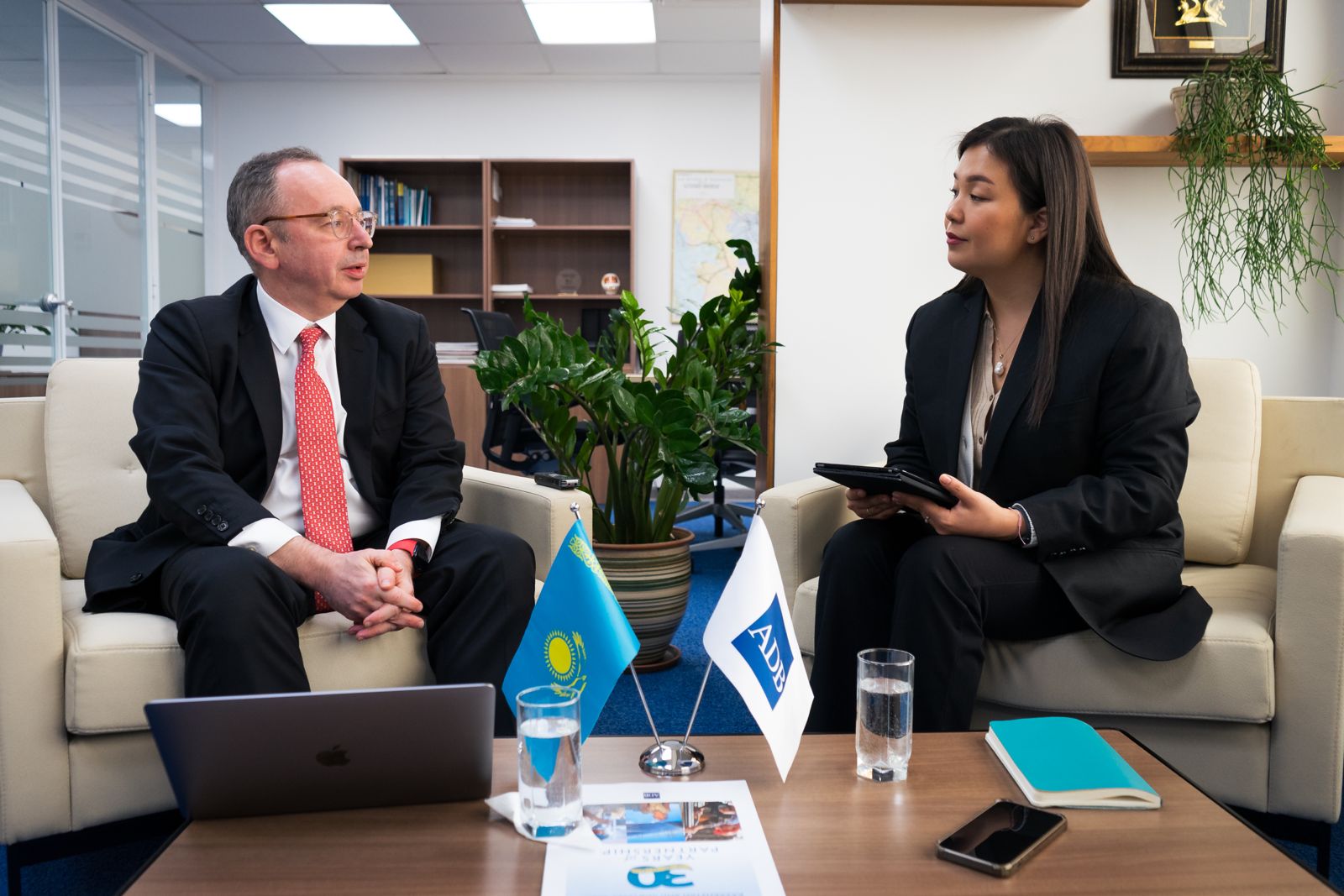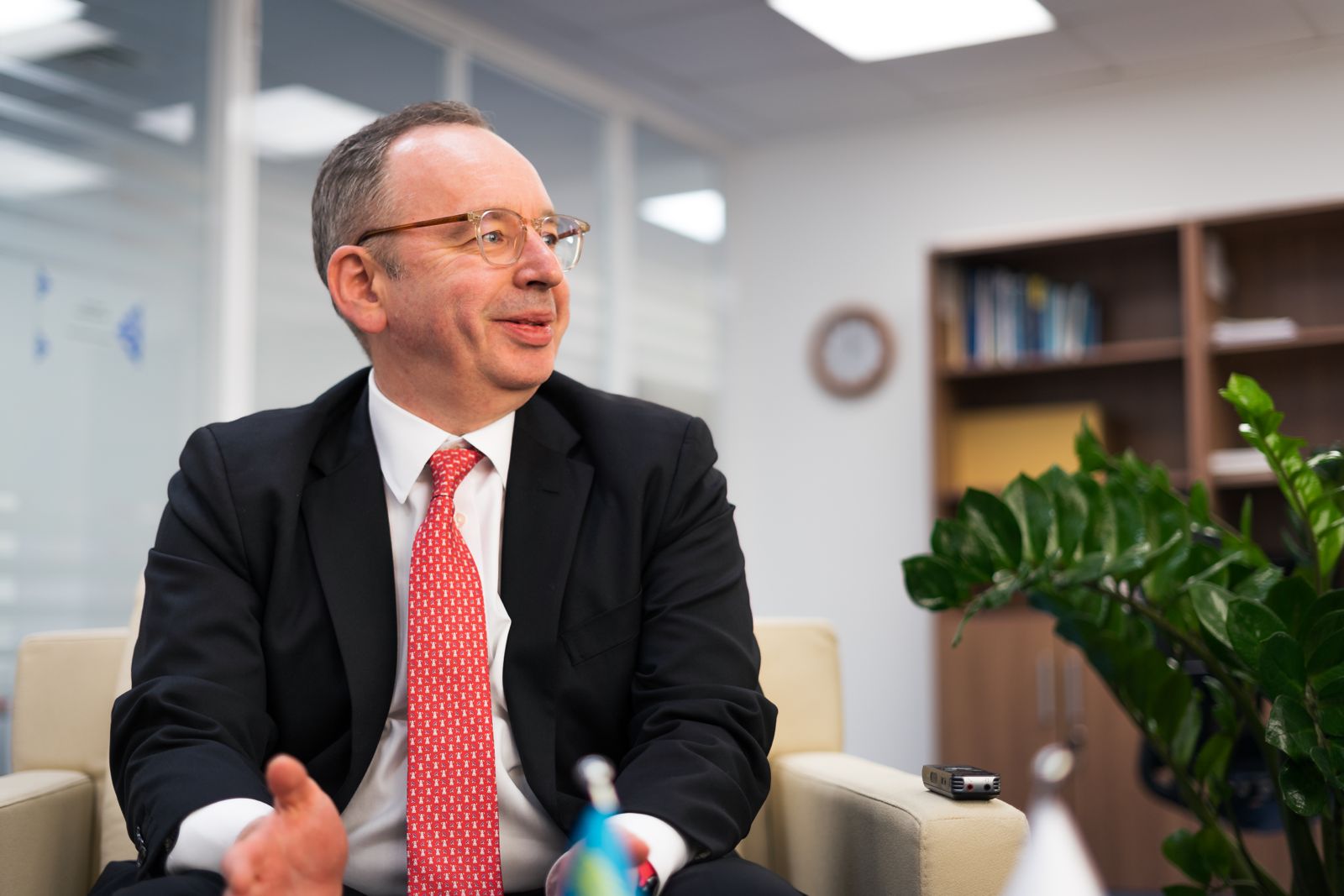ASTANA – The Asian Development Bank (ADB) and Kazakhstan are set to celebrate a momentous milestone in 2024, marking 30 years since Kazakhstan, the largest economy in Central Asia, joined ADB in January 1994. ADB Regional Director for Central Asia and West Asia Yevgeniy Zhukov spoke to The Astana Times about the key projects over this period, the country partnership strategy approved last year, and Kazakhstan’s chairmanship in the CAREC (Central Asia Regional Economic Cooperation) program.

The Astana Times senior editor Assel Satubaldina and ADB Regional Director for Central Asia and West Asia Yevgeniy Zhukov. Photo credit: ADB press service.
Over these three decades, ADB has been a strong supporter of Kazakhstan, committing close to $7 billion in assistance across 150 diverse projects.
“If we talk about the overall results, they are quite significant. ADB funded projects that helped to upgrade about 2,000 kilometers of roads and improve access to drinking water for over 60,000 people. Furthermore, more than 3,000 women were able to acquire housing with ADB’s assistance, and we provided business development support to about 30,000 SMEs [small and medium-sized enterprises],” said Zhukov, who hails from Kazakhstan.
Key projects
Reflecting on the early stages of the partnership, Zhukov mentioned a road project in 1996 to improve sections of the road from Almaty to Astana. Another project upgraded the heavily trafficked route between Bishkek and Almaty. The period from 2008 to 2010 also saw ADB bolster Kazakhstan’s road network, facilitating connectivity across Western China and Kazakhstan through the Russian Federation and further on to Western Europe.

Yevgeniy Zhukov. Photo credit: ADB press service.
“More recent interventions included countercyclical support in 2015. Recently we have also provided financing in local currency to the Otbasy Bank [Kazakhstan’s large second-tier bank offering mortgage programs] to provide mortgage loans to women,” said Zhukov.
ADB’s role was particularly crucial during the COVID-19 pandemic, offering significant financial support to Kazakhstan. This assistance enabled the government to extend social sector support to those impacted by the economic downturn and procure essential medical equipment.
ADB has also supported Kazakhstan’s renewable energy rollout. Important projects aimed at increasing solar energy production in the country include the Baikonur solar power plant in the Kyzylorda Region and M-KAT solar in the Zhambyl Region.
“Just last year, we provided assistance to transform the CHP 2 [combined heat and power plant] in Almaty from using coal to the combined cycle gas turbine units, significantly reducing the carbon emissions,” said Zhukov.
In 2024, ADB plans two transport projects – a road connecting Zhezkazgan and Kyzylorda and Saryagash bypass road.
“This project aims to connect the southern part of Kazakhstan with Uzbekistan and on to Turkmenistan in a much better way. We are also working with the private sector and looking for possible transactions in the energy sector,” he said.
New country partnership strategy
In 2023, ADB approved a new country partnership strategy for Kazakhstan, spanning from 2023 to 2027.
“This strategy aims to work with the government and the private sector to support the acceleration of resilient and sustainable economic growth by focusing on three pillars,” said Zhukov.
Three pillars entail combating climate change, including Kazakhstan’s ambitious commitment to achieving carbon neutrality by 2060, promoting inclusive economic growth, and enhancing governance.
“The cross-cutting themes of the strategy include supporting private sector development, promoting gender equality, and especially promoting regional cooperation,” he added. These themes are integral to creating a holistic approach to development that addresses Kazakhstan’s multifaceted challenges and opportunities.
In 2023, ADB made significant strides in implementing this strategy by approving two major interventions.
The first is a $350 million policy-based loan aimed at supporting the government’s efforts to improve fiscal governance and financial sector reforms. Additionally, ADB and Almaty Electric Stations signed a 98 billion Kazakhstan tenge local currency loan (US$214 million) to replace CHP in Almaty with state-of-the-art combined cycle gas turbine units.
Economic reforms
In 2023, Kazakhstan reported an economic growth of 5.1%, which Zhukov deemed “impressive.”
“We think that Kazakhstan’s economy has been recovering quite well, first from the economic shocks caused by the COVID pandemic in 2020 and later from the spillovers of the war in Ukraine. We expect that economic growth will continue to accelerate in the coming years,” he said.
ADB is expected to publish its updated economic outlook in April. In its latest report published in December, ADB experts revised its growth forecast for Kazakhstan, projecting a 4.5% rise in 2023 and 4.3% in 2024.
Increased regional cooperation and CAREC
Kazakhstan’s challenges are similar to those of the countries that Zhukov oversees. In addition to Kazakhstan, Zhukov leads ADB’s engagement with Afghanistan, Armenia, Azerbaijan, Georgia, the Kyrgyz Republic, Pakistan, Tajikistan, Turkmenistan, and Uzbekistan.
Challenges are related to the economic transition, development of the market economy and improving governance.
“Kazakhstan is by far the largest economy in the region and has one of the highest per capita GDP in the region. According to our classification and the World Bank’s classification, Kazakhstan is an upper-middle-income country, but the size of the market in Kazakhstan itself is not that large. What we see as important is to continue developing regional cooperation with other neighboring countries, thus increasing the market and helping Kazakhstan reach the goals of economic diversification,” said Zhukov.
Regional cooperation is a key component of the ADB-supported Central Asia Regional Economic Cooperation (CAREC) program, which Kazakhstan will chair in 2024. “CAREC was set up in 1997. Kazakhstan was one of the five founding members of CAREC,” he said.
Since 2001, the total investments in CAREC reached $50 billion across 280 projects.
“Between 2008 and 2018, the program improved the network of over 10,000 kilometers of roads and over 6,000 cubic kilometers of railway tracks. Such an increase in transport connectivity and efficiency benefited Kazakhstan specifically,” he said. “If we look at current investment in Kazakhstan itself, as of December last year, Kazakhstan received about $9.5 billion in CAREC investments, of which about $2 billion from ADB.”
This makes Kazakhstan’s CAREC portfolio the second largest among the CAREC member countries.
Overall, Zhukov stressed that the countries are increasingly keen to cooperate.
“In the late 1990s, we all talked about globalization, but now we see that unfortunately, the world is somewhat fracturing. Many countries in the region are quite small economically, so for them to survive and prosper, they really need to work together. I see that more and more the leadership in these countries realize it,” he explained.
According to him, recent geopolitical developments in and around the region have made countries realize that they need to work very closely together “if they want to maintain economic and political stability and sustainable economic development.”
“Since last year, we have noticed that the countries in the region have expressed more willingness and desire to cooperate among themselves, strengthen their economic ties, and diversify their logistic corridors. ADB through the CAREC program is very keen to continue providing support in this very important area because most of the countries are landlocked,” he said, highlighting the critical importance of improved connectivity and logistical routes for the region’s economic development.
Change in Kazakhstan
“In terms of the ongoing reforms in Kazakhstan, we listened very carefully to the President of the country [referring to Kassym-Jomart Tokayev] and his announcement of the new economic policy and a new and just Kazakhstan. ADB is quite supportive of efforts to liberalize the economy and increase its diversification, including investments in human capital and environmental sustainability,” he said.
Zhukov left Kazakhstan to study abroad in 1992, but he continued to visit his home country to see his parents.
“Throughout the years, I’ve noticed quite significant changes, and these changes are continuing. (…) When I left the country, the inflation rate was about 3,000% a year. If you receive your salary in the morning, you have to spend it by lunchtime. Otherwise, the worth of money will be much less,” he said.
According to him, compared to other countries, Kazakhstan excels in some areas.
“What I noticed by traveling in other parts of Asia or in North America or Europe is that some things in Kazakhstan, which people who live here take for granted, actually are not even available in those countries. (…) The digital infrastructure in Kazakhstan is very high-class, for example. In general, infrastructure has improved quite a lot. It’s a completely different place compared to 1992 when I left the country for the first time,” he said.
